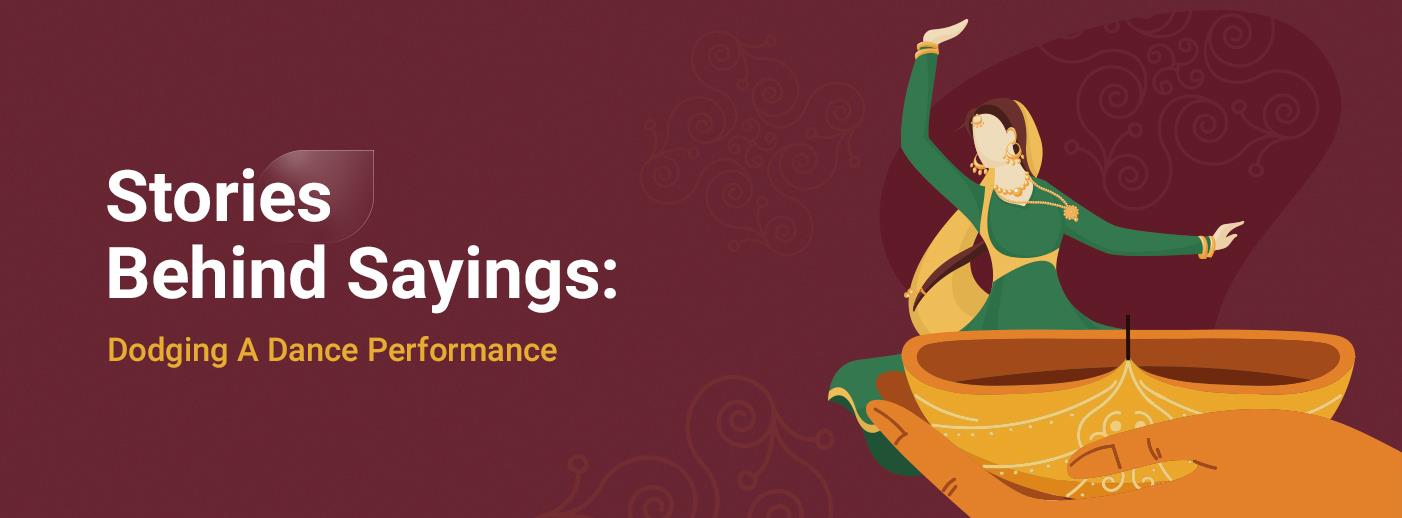زیادہ تلاش کیے گئے الفاظ
محفوظ شدہ الفاظ
کِھسیانی بِلّی کَھمبا نوچے
جسے غصہ آرہا ہو وہ دوسروں پر اپنی جھلاہٹ اتارتا ہے، بے بسی میں آدمی دوسروں پر غصہ اتارتا ہے، شرمندہ شخص دوسروں پر اپنی شرمندگی اتارتا ہے، کمزور کی جھنجھلاہٹ
چَمَنِسْتان
ایسا باغ جہاں پھول کثرت سے ہوں، ایسی جگہ جہاں دور تک پھول ہی پھول اور سبزہ سبزہ نظر آئے، گلزار، گلستان، باغ، پھولوں کا قطعہ، سبز کھیت
Stories Behind Sayings: Dodging A Dance Performance

In the realm of life's little inconveniences, how often do we find ourselves coerced into tasks that we neither desire nor excel at? I'm sure many of us can relate to this happening quite frequently! And in our attempts to wriggle out of these situations, we often set conditions that are tantalisingly close to the realm of impossibility.
Take, for instance, a scenario of being invited to a party in Bangalore that you have zero interest in attending. And in a feeble attempt to evade attendance, you say, "Sure, I'll come if there's no traffic," as if the universe would ever conspire to grant such a wish!
Or consider the plight of a hapless soul whose mother asks them to tidy up their chaotic closet, and in a bid for freedom, you declare, you'll do it only if she lets you go on a trip with your friends (trust me, my fellow readers, this one is a lost cause, as a woeful writer can attest from personal experience).
Continuing on the same pattern, today, we have one very interesting story in store, of posing such unattainable demands to avoid tasks, for you. This story has been associated with the famous Hindustani kahavat ‘na nau man tel hoga, na Radha nachegi’. (Radha, here is the name of a character and is in no way related to the Hindu goddess Radha).
So, the story goes like this:
There once lived a beautiful woman named Radha, in a land far, far away. Her dancing skills were so mesmerising that her name echoed through various neighbouring kingdoms. Kings, ministers, and royalties alike were all eager to witness her performances.
However, there was a twist in this tale. Despite her widespread fame, Radha's performances were quite limited. People had only heard about her charm and grace, but it seemed as if no one had actually seen her dance.
The irony of it all was that Radha was not such a good dancer after all. But, to her advantage, she was well aware of her mediocrity in the art form and would rarely perform in big gatherings or events. It was as if she had mastered the art of being famous without actually having to do much.
As fate would have it, Radha's reputation had spread far and wide, like a wildfire in the dry season. Tales of her exceptional talent had reached the royal courts of neighbouring cities, and they were all eager to witness her dance in person. It was as if Radha had become a legend that everyone wanted to see with their own eyes.
A group of royal court men were sent to Radha's village to invite her on behalf of the king. They told her that a grand royal procession had been planned, and the king would like her to enhance the event with her dancing skills. This procession would be graced by kings, ministers, and dignitaries from other cities as well.
Now, our dear Radha was in a bit of a pickle. She was well aware of her skills, or the lack thereof. She knew that with the talent she had, the royal event would be nothing short of a blunder. So, she had to think of a way to decline this invitation. But the reason would have to be something that would justify the reputation that had been associated with Radha's art after all. It was a tricky situation, but Radha was not one to back down from a challenge.
And so, to save herself from the inevitable embarrassment of her mediocre dancing skills, Radha put forth a demand that was both impossible to fulfil and reasonable enough to match the hype around her.
She demanded that every diyaa in the palace be filled with a whopping 9 man oil. (For context, one man roughly equals 40 kgs of weight and was used as a unit of measurement in older times in rural parts of South Asian countries.)
Now, the king might have been a king, but even he couldn't meet such a demand. And so, the invitation was withdrawn, much to the relief of Radha and her reputation, giving birth to the kahavat na nau man tel hoga, na Radha nachegi translating to 'neither would there be an arrangement of 9 man oil, nor would Radha have to dance.'
So, there you have it, folks. The story behind the saying is just as witty and amusing as the saying itself. We hope you enjoyed this little tale and that it inspires you to come up with your own impossible demands. Until next time, keep reading and stay clever!
Delete 44 saved words?
کیا آپ واقعی ان اندراجات کو حذف کر رہے ہیں؟ انہیں واپس لانا ناممکن ہوگا۔





